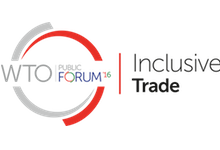Trade and inclusive access to knowledge
28 Sep 2016 15:00h - 16:30h
Event report
[Read more session reports and live updates from the 2016 WTO Public Forum.]
This session organised by the International Federation of Library Associations (IFLA), IDEA, and Innovarte, focused mainly on the impact of copyright on trade inclusivity and future scenarios.
At the beginning of the session, a video by Marietje Schaake, Member of the European Parliament (MEP), Member of the International Trade Committee, and Vice-President of the Delegation for Relations with the United States at the European Parliament, spoke about trade negotiations between the EU and the USA. Schaake pointed out that negotiation is crucial and that all stakeholders should be involved and copyright should be emphasised. However, there were plans on copyright which were not yet been implemented. She said that the more robust copyright law is, the more the EU can benefit from tax and trade rules. In the negotiation process on copyright, human rights also need to be considered.
Michele Woods, Director of Copyright Law Division at the World Intellectual Property Organisation (WIPO), talked about the limitations of copyright treaties and what can be expected from them. He explained the evolution of copyright and treaties at the WIPO.
Jonathan Band, Founder of Policy Bandwidth, talked about the Trans-Pacific Partnership Agreement. Band remarked that intellectual property (IP) should be part of the trade agreement and that the positive features of IP are safe harbours for internet service providers, balanced copyright, and proportionality in remedies.
James Love, Director of Knowledge Ecology International, discussed a broader copyright topic, which is trade agreements on public goods. As society recognises opportunities in the knowledge economy, reference to public goods should be included in trade agreements, such as having access to government funded research papers.
Bernt Hugenholtz, Professor of Intellectual Property Law and Director of Institute for Information Law at the University of Amsterdam, noted that distance education boosts potential for inclusive development. IP rights are important assets for both regulators and companies, and having strong IP rights will lead to innovation. Striking the right balance in copyright is an important step that should be achieved to ensure economy growth and international trade.
At the end of session, the panellists discussed how the World Trade Organisation can follow up the process of transparency, which is essential for enabling inclusiveness in trade and empowering the consumers.
by Aye Mya Nyein
Related topics
Related event

